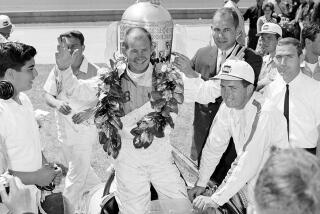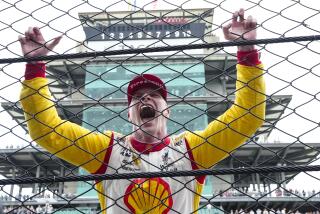Dallenbach on Final Lap After 20 Years as CART Steward
- Share via
Twenty years as referee, inspector, judge, jury, talent scout and father confessor to a bunch of high-strung race car drivers and their wealthy owners is long enough for Wally Dallenbach.
The former Indy car driver, who has been chief steward of Championship Auto Racing Teams almost since its inception in 1979, will be running the show for the last time in this weekend’s Marlboro 500 at California Speedway.
In honor of his departure, Dallenbach has been named grand marshal for the race and will give the command to start engines.
“I just feel that 20 years is a good round number,” Dallenbach said. “I hope to stay on as a consultant and help with the transition to a new chief steward, but I’m definitely stepping away from the day-to-day routine.”
What, really, does a chief steward do?
About the only time a chief steward is in the limelight is when he puts a driver on probation, or suspends one, for rough driving.
“That’s the hard part, penalizing a driver, because you’re dealing with his career, his livelihood,” he said. “But it’s only the tip of the iceberg, as to what the job entails.”
“As far as I am concerned, the chief steward runs the event, from the time the gates open on Friday to the time the race ends on Sunday. That includes track inspections for safety, screening new drivers, new equipment and if it’s a new track, checking on the surface, the walls, the runoff areas, everything that might affect the running of the race.”
The biggest change between 1980, when he gave up driving race cars to take the job on a trial basis, and today, is the attitude as the organization has grown into a world-wide enterprise.
“Back then, when CART was created, it was a different world,” Dallenbach said. “We had maybe eight or 10 races, with four or five drivers doing all the winning. It was an all-for-one, one-for-all attitude. We did things together, on and off the track, to make it happen. It was a struggle for survival then.
“Now that we are a premier racing organization, producing premier TV events, it has become very competitive in nature, involving millions of dollars. It’s not club racing anymore, it’s a professional sport dealing in the entertainment world.
“The championship is the thing now. . . . Nowadays, winning a race is just a step up the ladder toward the championship. We hardly thought about the championship. Thanks to CART, it has become something with tremendous value.”
As with umpiring, or refereeing a football game, if everything runs smoothly, no one notices a chief steward. But once there is trouble, he can become the focus of criticism.
During the start of last July’s race at Elkhart Lake, Wis., for instance, Dallenbach stopped the race after one lap when four cars crashed in the first turn and three more in the second.
Because of the long delay in getting the mess cleaned up and the 55-lap race restarted, the final 20 minutes of it were cut by ABC in favor of a golf tournament, triggering protests from TV viewers.
“I still think I made the right decision,” said Dallenbach. “I had only about 20 seconds to make it. In my opinion, fans at the race deserved more than having 19 or 20 cars on a four-mile track. I certainly had no idea that TV would not stay with us. All I knew was that if I let the race go, six guys would have been out. The fans at Elkhart Lake deserved a better show, but the people watching on TV really ate my lunch.”
Dallenbach’s other high-profile decisions have involved drivers, putting them on probation, or in some cases suspending or banning them.
He set Paul Tracy down for the opening race this year after a series of incidents during the 1998 season.
“A suspension or probation puts a focus on the driver,” Dallenbach said. “It makes him think before making another careless, or stupid, mistake. He knows he has one strike against him, and if he’s smart, he doesn’t want to find out about the next one.
“A guy like Paul Tracy, it took him a little longer to wake up to the fact that maybe it was him that was at fault, that we weren’t picking on him. He had all winter to think about it and I’m convinced it made a better race driver out of him.”
Despite having missed that first race, Tracy is third in the standings, behind only rookie sensation Juan Montoya and teammate Dario Franchitti.
Lending support to Dallenbach’s theory, two drivers, Montoya and Christian Fittipaldi, won races while on probation this year.
Having been a driver and having sons, Wally Jr. and Paul, who grew up in racing, has made Dallenbach’s job more trying.
“Michael Andretti is a very aggressive driver,” he said. “I can remember when there wasn’t anybody he wouldn’t intimidate with the nose of his car. That made it difficult on me. I’d raced against his dad [Mario], he had grown up with my sons.
“I had all those kids, Mario’s and the Unsers, under my roof for 20 years, treating them like my own. . . . With kids, if they get too aggressive, too short-tempered, you’ve got to slap them down.”
Dallenbach won a 500-mile race at Ontario Motor Speedway in 1973, qualified for 13 consecutive Indy 500s and while CART’s chief steward, qualified a car for Mario Andretti in 1981 at Indianapolis while Andretti was in Belgium for a Formula One race.
“I hadn’t been in a race car for 16 months and was sitting home Sunday night in Colorado, listening to the raindrops, when I got a call from Pat Patrick, telling me he wanted me to qualify Mario’s car the following weekend. I’d driven for Pat--in fact, all my wins came in his cars--so I said OK.
“I got to Indy on Tuesday, did 12 or 15 laps and was eighth quickest.”
In 1975, Dallenbach came within seven laps of winning the Indy 500. He started 20th, but after 50 laps had the lead and held it for 102 laps. Six laps after he’d dropped out with a burned piston while leading, the race was halted by rain and Bobby Unser was declared the winner.
It was Patrick who first talked Dallenbach into retiring as a driver to become CART’s chief steward.
“At the end of the ’79 season, which was CART’s first year, Pat asked me if I’d like to be chief steward. I told him I hadn’t thought about giving up racing, but I’d think about it. I went off elk hunting with Al Unser and we talked about it and when I got back, I called up Pat and said I’d try it for a year.”
That was 20 years ago, and the quiet man from Colorado is still calling the shots. For one more weekend, at least.
More to Read
Go beyond the scoreboard
Get the latest on L.A.'s teams in the daily Sports Report newsletter.
You may occasionally receive promotional content from the Los Angeles Times.










